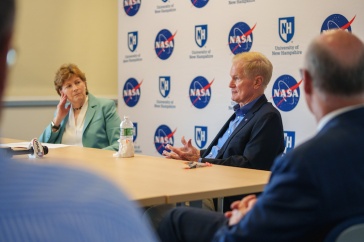
Nada Al-Haddad, a research assistant professor in the UNH Space Science Center, has been awarded a prestigious four-year, $690,000 NASA grant to support her solar-based research as an early-career scientist.
The grant is part of NASA's Early Career Investigator Program (ECIP) in heliophysics, which is designed to support outstanding scientific research and career development of scientists who study the connections between the sun and the solar system.
"This grant will enable us to take a leap towards resolving the mystery of the structure of solar eruptions – the main source of damage on satellites and a major issue for future space exploration – as we return to the Moon."
"Professor Al-Haddad's ECIP award is significant for many reasons, including the fact that it positions her with NASA as a leader in the next generation of space researchers," says Harlan Spence, director of the UNH Institute for the Study of Earth, Oceans, and Space. "We are so pleased that this award will grow her already innovative research program, adding to the strength of our Space Science Center."
ECIP is designed to foster the empowerment, inspiration and education of the next generation of space researchers. The program is open to scientists in permanent positions, whether tenure-track or not, who are within 10 years of receiving their Ph.D. Approximately 20 percent of ECIP applicants – 11 scientists including Al-Haddad – received funding in the latest round.
Al-Haddad joined the UNH Space Science Center as a research faculty member in 2020 after several years of conducting research at the Catholic University of America in Washington, D.C., and then teaching physics at UNH. Her research focuses on the magnetic structure of coronal mass ejections – large-scale eruptions of plasma and energy from the sun that can disrupt satellite communications, power grids and radio communications. She intends to use part of the ECIP grant to conduct a comprehensive data analysis of their structures using remote observations and measurements from satellites. With the remainder of the grant, Al-Haddad says she'll develop and validate models and techniques to improve the ability of these techniques to adequately represent the complexity of the coronal mass ejection structures.
"This grant will enable us to take a leap towards resolving the mystery of the structure of solar eruptions – the main source of damage on satellites and a major issue for future space exploration – as we return to the moon," Al-Haddad explains. "It will help us to understand the global structure of such eruptions and make progress towards forecasting their effect. Combined with awards I've received in the past six months from the National Science Foundation, this award will also facilitate starting a research group at UNH to further investigate solar eruptions."
The Institute for the Study of Earth, Oceans, and Space (EOS) is UNH's largest research enterprise, comprising six centers with a focus on interdisciplinary, high-impact research on Earth and climate systems, space science, the marine environment, seafloor maping, and environmental acoustics. With more than $60 million in external funding secured annually, EOS fosters an intellectual and scientific environment that advances visionary scholarship and leadership in world-class research and graduate education.
-
Written By:
Rebecca Irelan | Institute for the Study of Earth, Oceans, and Space | rebecca.irelan@unh.edu | 603-862-0990



















































